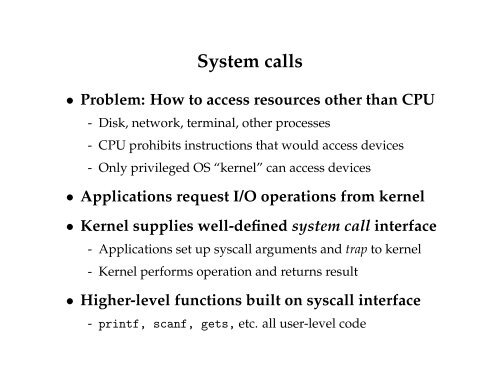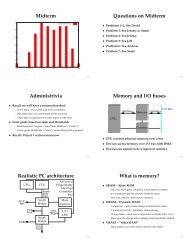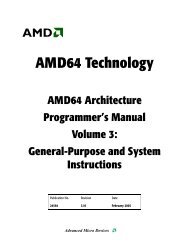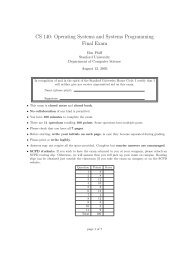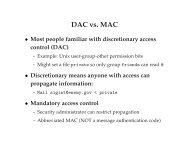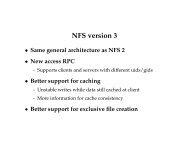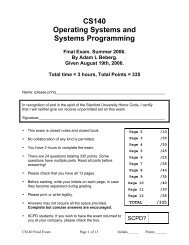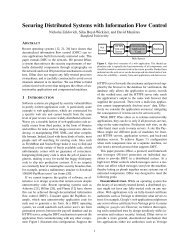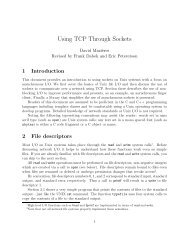System calls - Stanford Secure Computer Systems Group
System calls - Stanford Secure Computer Systems Group
System calls - Stanford Secure Computer Systems Group
Create successful ePaper yourself
Turn your PDF publications into a flip-book with our unique Google optimized e-Paper software.
<strong>System</strong> <strong>calls</strong>• Problem: How to access resources other than CPU- Disk, network, terminal, other processes- CPU prohibits instructions that would access devices- Only privileged OS “kernel” can access devices• Applications request I/O operations from kernel• Kernel supplies well-defined system call interface- Applications set up syscall arguments and trap to kernel- Kernel performs operation and returns result• Higher-level functions built on syscall interface- printf, scanf, gets, etc. all user-level code
I/O through the file system• Applications “open” files/devices by name- I/O happens through open files• int open(char *path, int flags, ...);- flags: O RDONLY, O WRONLY, O RDWR- O CREAT: create the file if non-existent- O EXCL: (w. O CREAT) create if file exists already- O TRUNC: Truncate the file- O APPEND: Start writing from end of file- mode: final argument with O CREAT• Returns file descriptor—used for all I/O to file
File descriptor numbers• File descriptors are inherited by processes- When one process spawns another, same fds by default• Descriptors 0, 1, and 2 have special meaning- 0 – “standard input” (stdin in ANSI C)- 1 – “standard output” (stdout, printf in ANSI C)- 2 – “standard error” (stderr, perror in ANSI C)- Normally all three attached to terminal• Example: type.c
The rename system call• int rename (const char *p1, const char *p2);- Changes name p2 to reference file p1- Removes file name p1• Guarantees that p2 will exist despite any crashes- p2 may still be old file- p1 and p2 may both be new file- but p2 will always be old or new file• fsync/rename idiom used extensively- E.g., emacs: Writes file .#file#- Calls fsync on file descriptor- rename (".#file#", "file");
• int fork (void);Creating processes- Create new process that is exact copy of current one- Returns process ID of new proc. in “parent”- Returns 0 in “child”• int waitpid (int pid, int *stat, int opt);- pid – process to wait for, or -1 for any- stat – will contain exit value, or signal- opt – usually 0 or WNOHANG- Returns process ID or -1 on error
Deleting processes• void exit (int status);- Current process ceases to exist- status shows up in waitpid (shifted)- By convention, status of 0 is success, non-zero error• int kill (int pid, int sig);- Sends signal sig to process pid- SIGTERM most common value, kills process by default(but application can catch it for “cleanup”)- SIGKILL stronger, kills process always
Running programs• int execve (char *prog, char **argv, char **envp);- prog – full pathname of program to run- argv – argument vector that gets passed to main- envp – environment variables, e.g., PATH, HOME• Generally called through a wrapper functions• int execvp (char *prog, char **argv);- Search PATH for prog- Use current environment• int execlp (char *prog, char *arg, ...);- List arguments one at a time, finish with NULL• Example: minish.c
Manipulating file descriptors• int dup2 (int oldfd, int newfd);- Closes newfd, if it was a valid descriptor- Makes newfd an exact copy of oldfd- Two file descriptors will share same offset(lseek on one will affect both)• int fcntl (int fd, F SETFD, int val)- Sets close on exec flag if val = 1, clears if val = 0- Makes file descriptor non-inheritable by spawned programs• Example: redirsh.c
Pipes• int pipe (int fds[2]);- Returns two file descriptors in fds[0] and fds[1]- Writes to fds[1] will be read on fds[0]- When last copy of fds[1] closed, fds[0] will return EOF- Returns 0 on success, -1 on error• Operations on pipes- read/write/close – as with files- When fds[1] closed, read(fds[0]) returns 0 bytes- When fds[0] closed, write(fds[1]):- Kills process with SIGPIPE, or if blocked- Fails with EPIPE• For example code, see pipesh.c on web site
Sockets: Communication between machines• Datagram sockets: Unreliable message delivery- With IP, gives you UDP- Send atomic messages, which may be reordered or lost- Special system <strong>calls</strong> to read/write: send/recv• Stream sockets: Bi-directional pipes- With IP, gives you TCP- Bytes written on one end read on the other- Reads may not return full amount requested—must re-read
Socket naming• Recall how TCP & UDP name communicationendpoints- 32-bit IP address specifies machine- 16-bit TCP/UDP port number demultiplexes within host- Well-known services “listen” on standard ports: finger—79,HTTP—80, mail—25, ssh—22- Clients connect from arbitrary ports to well known ports• A connection can be named by 5 components- Protocol (TCP), local IP, local port, remote IP, remote port- TCP requires connected sockets, but not UDP
<strong>System</strong> <strong>calls</strong> for using TCPClientServersocket – make socketbind – assign addresslisten – listen for clientssocket – make socketbind* – assign addressconnect – connect to listening socketaccept – accept connection*This call to bind is optional; connect can choose address & port.
Server interfacestruct sockaddr_in sin;int s = socket (AF_INET, SOCK_STREAM, 0);bzero (&sin, sizeof (sin));sin.sin_family = AF_INET;sin.sin_port = htons (9999);sin.sin_addr.s_addr = htonl (INADDR_ANY);bind (s, (struct sockaddr *) &sin, sizeof (sin));listen (s, 5);for (;;) {socklen_t len = sizeof (sin);int cfd = accept (s, (struct sockaddr *) &sin, &len);/* cfd is new connection; you never read/write s */do_something_with (cfd);close (cfd);}
A fetch-store server• Clients sends commands, gets responses over TCP• Fetch command- Command consists of string “fetch\n”- Response contains last contents of file stored there• Store command- Command consists of “store\n” followed by file- Response is “OK” or “ERROR”• What if server or network goes down during store?- Don’t say “OK” until data safely on disk (c.f. email)• Example: fetch store.c
Using UDP• Call socket with SOCK DGRAM, bind as before• New system <strong>calls</strong> for sending individual packets- int sendto(int s, const void *msg, int len, int flags,const struct sockaddr *to, socklen t tolen);- int recvfrom(int s, void *buf, int len, int flags,struct sockaddr *from, socklen t *fromlen);- Must send/get peer address with each packet• Example: udpecho.c• Can use UDP in connected mode (Why?)- connect assigns remote address- send/recv sys<strong>calls</strong>, like sendto/recvfrom w/o last 2 args
Uses of connected UDP sockets• Kernel demultplexes packets based on port- So can have different processes getting UDP packets fromdifferent peers- For security, ports < 1024 usually can’t be bound- But can safely inherit UDP port below that connected toone particular peer• Feedback based on ICMP messages (future lecture)- Say no process has bound UDP port you sent packet to. . .- With sendto, you might think network dropping packets- Server sends port unreachable message, but only detect itwhen using connected sockets
Performance definitions• Bandwidth – Number of bits/time you can transmit- Improves with technology• Latency – How long for message to cross network- Propagation + Transmit + Queue- We are stuck with speed of light. . .10s of milliseconds to cross country• Throughput – TransferSize/Latency• Jitter – Variation in latency• What matters most for your application?
Small request/reply protocolClientServerrequestreply• Small message protocols typically dominated bylatency
Large reply protocolClientrequestServerreply• For bulk tranfer, throughput is most important
Bandwidth-delayDelayBandwidth• Can view network as a pipe- For full utilization want bytes in flight ≥ bandwidth×delay- But don’t want to overload the network (future lectures)• What if protocol doesn’t involve bulk transfer?- Get throughput through concurrency—service multipleclients simultaneously
Traditional fork-based servers• When is a server not transmitting data- Read or write of a socket connected to slow client can block- Server may be busy with CPU (e.g., computing response)- Server might be blocked waiting for disk I/O• Can gain concurrency through multiple processes- Accept, fork, close in parent; child services request• Advantages of one process per client- Don’t block on slow clients- May scale to multiprocessors if CPU intensive- For disk-heavy servers, keeps disk queues full(similarly get better scheduling & utilization of disk)
Threads• One process per client has disadvantages:- High overhead – fork+exit ∼ 100 µsec- Hard to share state across clients- Maximum number of processes limited• Can use threads for concurrency- Data races and deadlock make programming tricky- Must allocate one stack per request- Many thread implementations block on some I/O or haveheavy thread-switch overhead
Non-blocking I/O• fcntl sets O NONBLOCK flag on descriptorint n;if ((n = fcntl (s, F_GETFL)) >= 0)fcntl (s, F_SETFL, n | O_NONBLOCK);• Non-blocking semantics of system <strong>calls</strong>:- read immediately returns -1 with errno EAGAIN if no data- write may not write all data, or may return EAGAIN- connect may “fail” with EINPROGRESS (or may succeed, ormay fail with real error like ECONNREFUSED)- accept may fail with EAGAIN if no pending connections
How do you know when to read/write?struct timeval {long tv_sec; /* seconds */long tv_usec; /* and microseconds */};int select (int nfds, fd_set *readfds, fd_set *writefds,fd_set *exceptfds, struct timeval *timeout);FD_SET(fd, &fdset);FD_CLR(fd, &fdset);FD_ISSET(fd, &fdset);FD_ZERO(&fdset);


